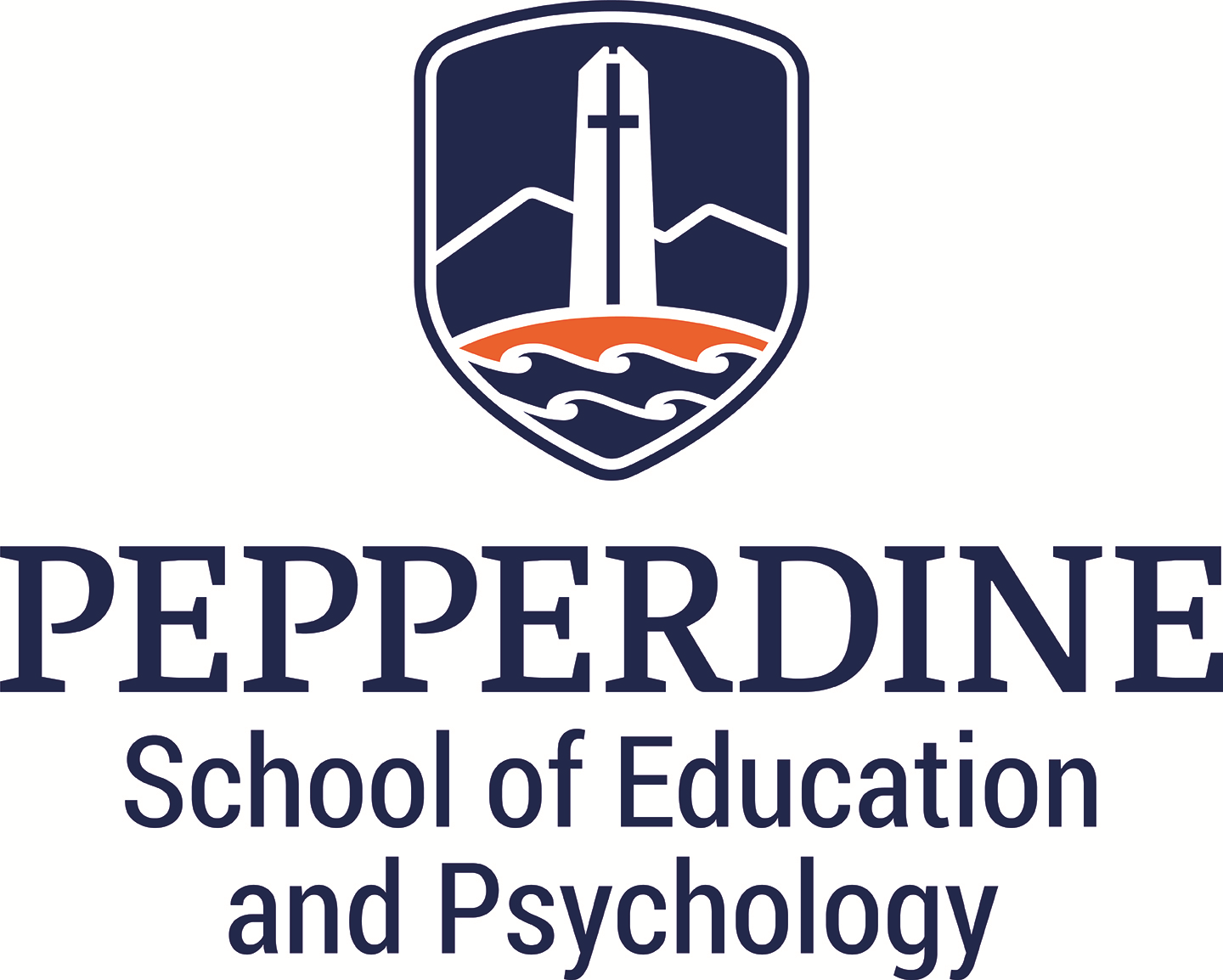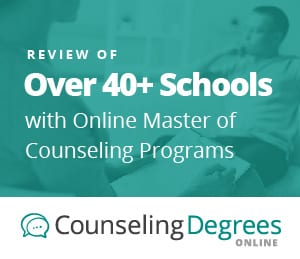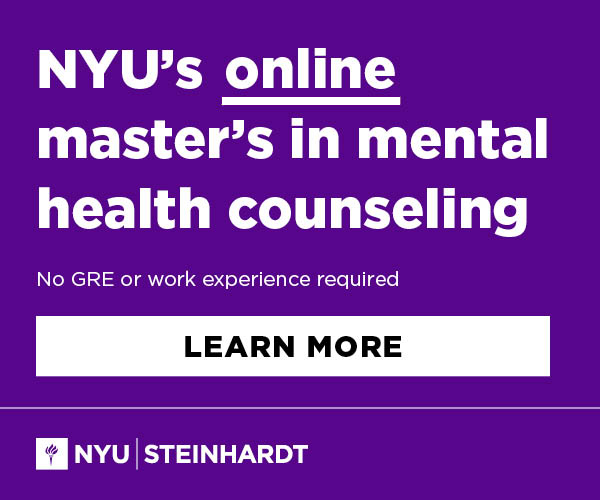 Walden University : MS in Psychology (HLC Accredited)
Walden University : MS in Psychology (HLC Accredited) Walden University : PhD in Clinical Psychology (HLC Accredited)
Walden University : PhD in Clinical Psychology (HLC Accredited) Pepperdine University : Master of Arts in Psychology (No GRE required)
Pepperdine University : Master of Arts in Psychology (No GRE required) Southern New Hampshire University (SNHU) : MS Psychology (Flexible. Affordable. And achievable.)
Southern New Hampshire University (SNHU) : MS Psychology (Flexible. Affordable. And achievable.) Southern New Hampshire University (SNHU) : Online Psychology Degrees (Bachelors and Masters. Flexible. Affordable. And achievable.)
Southern New Hampshire University (SNHU) : Online Psychology Degrees (Bachelors and Masters. Flexible. Affordable. And achievable.) Southern New Hampshire University (SNHU) : MS Psychology with concentration in Child and Adolescent Developmental Psychology (Flexible. Affordable. And achievable.)
Southern New Hampshire University (SNHU) : MS Psychology with concentration in Child and Adolescent Developmental Psychology (Flexible. Affordable. And achievable.) The Chicago School : Ph.D. in Applied Behavior Analysis (Online Programs.)
The Chicago School : Ph.D. in Applied Behavior Analysis (Online Programs.) The Chicago School : Ph.D. in Counselor Education and Supervision (Online Programs.)
The Chicago School : Ph.D. in Counselor Education and Supervision (Online Programs.) National University : Doctor of Philosophy in Psychology (Accredited. No GRE. Scholarships Available)
National University : Doctor of Philosophy in Psychology (Accredited. No GRE. Scholarships Available)The first step in pursuing jobs within this field is to complete an undergraduate degree in a related field, such as a bachelor’s in psychology. However, those interested in becoming licensed psychologists must complete additional education, complete training, and pass a state licensing exam.
Psychologist Job Description
Psychologists observe and interpret their clients’ attitudes and behaviors by studying their emotional, cognitive, and social processes. Professionals within this field also work to understand why clients feel, think, and behave the way they do and look for behavioral patterns that may be linked to certain events, such as stress at work or at home, or the loss of a job or a loved one.
A psychologist’s job description can vary greatly depending on whether the psychologist works in private practice or at a hospital, or is employed by a school district. Job duties can also vary depending on whether the psychologist works as a counseling psychologist or clinical psychologist. Common daily tasks may include the following:
Consider a Featured Online Counseling Program
| School and Program Information | Online Program? Entry Requirements |
Course Information |
|---|---|---|
| Walden University
MS in Psychology
HLC Accredited |
✔ Online
|
Benefit from this specialization’s comprehensive study of the social, cultural, and cognitive aspects of human behavior as you explore the fundamentals of psychology, including its theories, methods, and principles. You can evaluate and design research methods and examine multicultural and/or global perspectives of psychology. This specialization also offers an optional doctoral preparation track, for those who want a head start on their doctorate. If you choose Walden’s competency-based Tempo Learning® format, you’ll have access to three-month, all-you-can-learn subscriptions, no weekly deadlines, and faculty and coach support when needed. Learn More |
| Walden University
PhD in Clinical Psychology
HLC Accredited |
✔ Online
|
Gain the skills to assess mental wellness and provide interventions. Taught by respected psychology faculty, coursework explores current theories and empirically supported practice. You can combine scholarly research with practical experience. Learn More |
| Pepperdine University
Master of Arts in Psychology
Open to all undergrad majors |
✔ Online
No GRE Required |
Earn a Master’s in Psychology Online in 18 Months Learn More |
| Southern New Hampshire University (SNHU)
MS Psychology
NECHE Accredited |
✔ Online
No application fee or GRE/GMAT scores required |
Stick with the general track or choose one of 3 concentrations: child and adolescent development psychology, forensic psychology and industrial organizational psychology. Learn More |
| Southern New Hampshire University (SNHU)
Online Psychology Degrees
Bachelors and Masters NECHE Accredited |
✔ Online
No application fee or GRE/GMAT scores required |
With our unique programs - from child and adolescent development to forensic psychology - you'll be prepared for a wide variety of careers in case management, research, human resources, youth services and social services. Learn More |
| Southern New Hampshire University (SNHU)
MS Psychology with concentration in Child and Adolescent Developmental Psychology
NECHE Accredited |
✔ Online
No application fee or GRE/GMAT scores required |
In the master's in child psychology online program, you'll develop assessment, evaluation and treatment strategies that address the unique individual, cultural and psychological needs of children and families. Learn More |
| The Chicago School
Ph.D. in Applied Behavior Analysis
Credential Track options are also available. |
✔ Online
Master's Degree Required. |
The Chicago School’s Online Ph.D. in Applied Behavior Analysis (ABA) program provides a solid knowledge base in the experimental analysis of behavior, applied behavior analysis, and radical behaviorism, equipping graduates with the skills needed to bring about socially significant behavioral changes through evidence-based program development. Learn More |
| The Chicago School
Ph.D. in Counselor Education and Supervision
|
✔ Online
Master's Degree Required. |
The online Ph.D. in Counselor Education and Supervision program prepares graduates to act as educators and leaders in the field of counseling. Ph.D. Supervision students engage in the evaluation of theoretical and practical aspects of counseling through both qualitative and quantitative research. Learn More |
| National University
Doctor of Philosophy in Psychology
COAMFTE Accredited |
✔ Online
GRE Scores Not Required |
Earn a degree in Counseling Psychology, Gerontology, or Substance-Related and Addictive Disorder Learn More |
*Sponsored Counseling Programs
Online CACREP Accredited programs | Online MPCAC Accredited programs
 Walden University - MS in Psychology (HLC Accredited)
Walden University - MS in Psychology (HLC Accredited)
 Walden University - PhD in Clinical Psychology (HLC Accredited)
Walden University - PhD in Clinical Psychology (HLC Accredited)
 Pepperdine University - Master of Arts in Psychology (ABAI Accredited)
Pepperdine University - Master of Arts in Psychology (ABAI Accredited)
 Southern New Hampshire University (SNHU) - MS Psychology (NECHE Accredited)
Southern New Hampshire University (SNHU) - MS Psychology (NECHE Accredited)
 Southern New Hampshire University (SNHU) - Online Psychology Degrees (NECHE Accredited)
Southern New Hampshire University (SNHU) - Online Psychology Degrees (NECHE Accredited)
 The Chicago School - Ph.D. in Applied Behavior Analysis (WASC and WSCUC Accredited)
The Chicago School - Ph.D. in Applied Behavior Analysis (WASC and WSCUC Accredited)
 The Chicago School - Ph.D. in Counselor Education and Supervision (WASC and WSCUC Accredited)
The Chicago School - Ph.D. in Counselor Education and Supervision (WASC and WSCUC Accredited)
 National University - Doctor of Philosophy in Psychology (COAMFTE Accredited)
National University - Doctor of Philosophy in Psychology (COAMFTE Accredited)
Types of Psychologists
Counseling Psychologist Job Description
Counseling psychologists help patients address emotional concerns relating to their personal, social, and professional life and their general mental well-being. They also help clients overcome difficult experiences, such as the breakup of a relationship or the loss of a family member, and emotional stressors, such as anxiety. A counseling psychologist’s primary role is to provide patient consultations and develop individualized treatment plans. Other job duties may include the following:
- Building trust and rapport with patients
- Developing individualized mental health treatment plans
- Meeting with clients of all ages, ethnicities, and socioeconomic backgrounds
- Tracking patients’ progress
Counseling Psychologist Education Options
Clinical Psychologist Job Description
Similar to counseling psychologists, clinical psychologists work with patients of all ages and backgrounds to help them identify and diagnose various emotional, behavioral, and psychological issues. The primary difference between the two specialties is that clinical psychologists often work with patients seeking treatment for more serious issues, such as borderline personality disorder, obsessive compulsive disorder, and severe cases of agoraphobia. Common job duties may include the following:
- Collaborating with patients’ other health care providers, such as doctors and psychiatrists, to develop holistic treatment plans
- Assessing clients’ behavioral, emotional, and psychological state
- Using various treatment methods, such as talk therapy, psychotherapy, and behavior modification therapy, depending on their clients’ needs
- Maintaining client records
- Monitoring the effectiveness of treatment plans and making modifications as needed
Additional Types of Psychologists
- Behavioral Psychologist
- Forensic Psychologist
- Social Psychologist
- Psychiatric Mental Health Nurse Practitioner
- Spiritual Psychologist
- Sports Psychologist
Psychologist Education Requirements
The educational requirements to become a psychologist vary based on the type of position you’re interested in. The U.S. Bureau of Labor Statistics (BLS) reports that most states require counseling, clinical, and research psychologists to hold a doctoral degree in psychology, such as a Ph.D. in psychology or a Doctor of Psychology (Psy.D.).
The primary difference between these degree programs is in their focus: Ph.D. programs place a greater emphasis on research, and Psy.D. programs emphasize clinical work. Consequently, students interested in conducting and overseeing research studies as part of their professional career may find that Ph.D. programs align best with their goals. Students drawn toward practical, hands-on work, such as counseling patients, may find Psy.D. programs to be a better fit.
Students researching online master’s in psychology programs, however, may be interested to learn that upon completion of their program, they’ll be eligible to pursue numerous positions within the mental health field. Sample positions may include the following:
- Substance abuse counselor
- Behavioral counselor
- Mental health counselor
- Marriage and family therapist
- Private practice therapist
- School counselor
Psychologist Educational Resources
Possible Work Environments for Psychologists
The BLS reports that in 2020, 27% of psychologists were self-employed, and 25% worked for public and private elementary and secondary schools. A total of 20% were employed by ambulatory health care services; 10% by governmental institutions; and 6% by state, local, and private hospitals.
The work environment largely depends on the patient population a psychologist works with. For example, those who provide services to students may work Monday through Friday in a school setting and have extended time off in the summer and during holiday periods. On the other hand, individuals working in hospitals or health care facilities may need to work nights, holidays, and weekends. Psychologists in private practice may have the most flexible schedules, as they often set their own hours. Lastly, some psychologists may also offer telehealth appointments, which they can conduct from their workplace or home office.
How to Become a Licensed Psychologist
The first step in becoming a licensed psychologist is to earn a degree from an accredited institution, as colleges and universities that are accredited have demonstrated that their degree programs meet or exceed certain educational standards. A database of accredited institutions can be found on the Education Department’s Office of Postsecondary Education’s website.
Ensuring that your program is accredited is crucial: Students who don’t have an accredited bachelor’s degree will be unable to apply to an accredited master’s program; students who don’t hold an accredited master’s degree will be unable to apply to an accredited doctoral program; and graduates who hold an unaccredited master’s or doctoral degree will not be permitted to sit for the psychologist licensing exam.
Upon completing the required degree programs and the specified number of supervised clinical training hours required, you’ll be eligible to sit for the state licensing exam. Individuals who receive a passing grade will be granted their licensed psychologist credential.
How Long Does It Take to Become a Psychologist?
Some states license psychologists after they’ve completed a master’s degree in a related field, such as a master’s in psychology, master’s in counseling, or master’s in behavioral analysis, while other states require aspiring psychologists to hold a doctorate. Additionally, each state has its own requirements for the number of supervised clinical training hours an individual must complete before sitting for a licensing exam.
Consequently, the time it takes to become a psychologist varies and includes factors such as whether a student enrolls in full- or part-time coursework. For example, students taking a full-time course load can often finish a bachelor’s degree within four years and complete a master’s degree in two to three years, depending on the program. If a doctoral degree is required, that can add an additional four to seven years of coursework.
Additionally, the clinical hours requirement varies widely by state. For example, while New York requires that candidates participate in 2,000 hours of predoctoral training and log an additional 1,750 hours in postdoctoral training, Texas requires that applicants complete a minimum of 1,750 supervised clinical hours both during and after their doctoral program, for a total of 3,500 hours. Due to these differences, some students can become licensed psychologists in as few as eight years, but for others, the process can take up to 12.
How to Become a Counseling Psychologist
Students interested in working with patients who are healthier and have less serious pathological problems may find themselves drawn to this career path. As for other types of licensed psychologists, students will need to earn at least a master’s degree in a related field, complete a set number of supervised clinical hours, and pass a state licensing exam.
In addition to becoming licensed, counseling psychologists can pursue various certifications through the National Board for Certified Counselors (NBCC), such as National Certified Counselor (NCC), Certified Clinical Mental Health Counselor (CCMHC), Master Addictions Counselor (MAC), and National Certified School Counselor (NCSC). Credentialing prerequisites for each certification can be found on the NCC website. While certification isn’t required, it can help psychologists specialize their practice.
How Long Does It Take to Become a Counseling Psychologist?
The amount of time it takes to become a counseling psychologist can vary widely, based on whether you’re enrolled in a part-time, a full-time, or an accelerated program; the number of hours you’re enrolled in; and the number of supervised clinical hours you’re required to complete before you can sit for your state’s licensing exam.
Some students find that they can complete their licensing prerequisites in as few as eight years, whereas others require 12.
How to Become a Clinical Psychologist
Clinical psychologists often work with patients who have serious long-term issues, such as obsessive compulsive disorder, eating disorders, borderline personality disorder, and PTSD.
The steps to become a clinical psychologist are parallel to those for becoming a counseling psychologist: at least a master’s degree in psychology or a related field, and in some states, a doctorate; a set number of supervised clinical hours, specified by the state; and a licensing exam.
Clinical psychologists can further pursue various specialty certifications through the American Board of Professional Psychology (ABPP), such as Clinical Child and Adolescent Psychology specialist, Behavioral and Cognitive specialist, and Clinical Health specialist. Credentialing prerequisites can be found on the ABPP website.
How Long Does It Take to Become a Clinical Psychologist?
The amount of time it takes to become a clinical psychologist depends on your state’s licensing requirements. Clinical psychologists in some states can become licensed in as few as eight years, while those in other states take up to 12.
Other factors include whether you’re enrolled as a part-time or full-time student, whether you take time off between your degrees, and whether you enroll in an accelerated program.
Skills Needed to Be a Psychologist
Students interested in becoming psychologists should develop various skills.
Analytical and Observational Skills
Psychologists work with numerous patients, and they must understand how to collect and examine the information they receive from each client. They must evaluate patients’ facial expressions, body language, and tone of voice to draw conclusions and develop treatment plans.
Communication Skills
Professionals in this field work with patients of various ages, ethnicities, socioeconomic statuses, gender identities, and educational backgrounds. A key element of the job is listening, and those with strong verbal and nonverbal communication skills who are able to successfully receive and relay information to clients of a wide variety of backgrounds are likely to be most successful.
Interpersonal Skills
Psychologists with strong interpersonal skills are often viewed as caring, comforting, empathic, reliable and aware. This skill set is highly important as it helps professionals build rapport with their clients.
Integrity
Patients seeking help for mental health issues, such as anxiety, depression, stress, or psychological trauma, or who are struggling to cope with the loss of a loved one or relationship, must feel comfortable discussing their feelings, fears, and emotions with their psychologist. Consequently, professionals within this field must maintain the highest levels of professional integrity
Further Your Education to Become a Licensed Psychologist
Are you interested in pursuing a career as a licensed psychologist? Explore some of the most popular online master’s in psychology degree programs, including the following:
- Online master’s in behavioral analysis
- Online master’s in clinical mental health counseling
- Online master’s in counseling psychology
- Online master’s in mental health counseling
- Online master’s in rehabilitation counseling
- Online master’s in school counseling
On each page, you’ll find detailed information about each program, including their application and admissions requirements, curriculum and coursework information, the number of credit hours you’ll need to graduate, and which programs that are currently accepting applicants.
Sources
Betterteam, Counseling Psychologist Job Description
GoodTherapy, “What’s the Difference Between a PsyD and a PhD?”
Indeed, Clinical Psychologist Job Description: Top Duties and Qualifications
Monster, Psychologist Job Description Template
The Balance Careers, “What Does a Psychologist Do?”
The Boston Globe, “It’s Becoming Impossible to Find a Therapist”
U.S. Bureau of Labor Statistics, Psychologists
U.S. Bureau of Labor Statistics, Substance Abuse, Behavioral Disorder, and Mental Health Counselors











